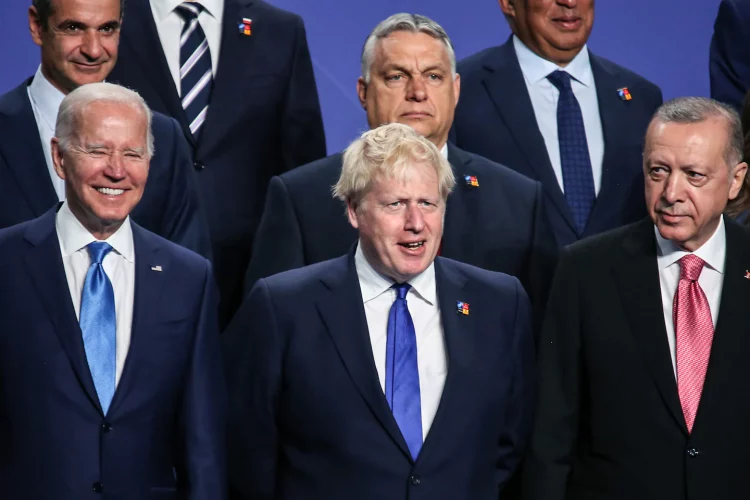Placeholder while article actions load
NATO on Wednesday announced it was formally inviting Finland and Sweden to join the alliance. It’s a move that would bring the number of member states to 32 — and revamp Europe’s regional security amid a grinding Russian war in Ukraine.
But up until the last minute, even as NATO leaders gathered Tuesday for a summit in Madrid, it was unclear whether the alliance would agree to allow Finland and Sweden to join. For weeks, NATO member Turkey had threatened to block the two Nordic countries from accession, calling them safe havens for groups Ankara considers terrorist organizations.
“NATO membership comes with responsibilities. If Sweden and Finland are to become members of NATO, they have to take into account the security concerns of Turkey,” Turkish President Recep Tayyip Erdogan told reporters in Ankara ahead of the summit.
An 11th-hour deal between Finland, Sweden and Turkey persuaded Erdogan to drop his objections. In a three-page memorandum signed Tuesday, Finland and Sweden agreed to withhold support for Kurdish fighters in Syria and followers of the U.S.-based Turkish Muslim cleric Fethullah Gulen, whom Ankara accuses of masterminding a coup attempt in 2016.
The document also calls on the Finnish and Swedish governments to shut down finance and recruitment networks associated with the Kurdistan Workers’ Party, or PKK. The group, which both Turkey and the United States have deemed a terrorist organization, has waged a decades-long war for autonomy for the country’s ethnic Kurdish minority.
In Turkey, pro-government media seized on the deal as a historic victory for Ankara, lauding the president for his “decisiveness” and “vision” in bringing Turkish concerns to the world stage.
“Turkey hit the table with [its] fist! Europe has come to its knees,” read a Wednesday headline in the pro-government Yeni Akit newspaper.
Erdogan “saw an opportunity here with the Ukraine crisis in trying to get some concessions out of NATO’s members to prop up his international image,” said Merve Tahiroglu, Turkey program coordinator at Project on Middle East Democracy.
“He wanted to prove with this move … that he’s at the table and he’s the type of leader that cannot be ignored — and his demands have to be acknowledged and he has to be engaged with,” she said.
One of his goals, Tahiroglu said, was face time with President Biden and other NATO leaders. On Wednesday, Erdogan and Biden met on the sidelines of the summit.
Biden “welcomed Turkey’s conclusion of a trilateral agreement with Finland and Sweden” to allow their NATO bids to move forward, according to a White House readout of the encounter.
Also Wednesday, a senior U.S. defense official said that the Biden administration was throwing its support behind the potential sale of U.S. F-16 fighter jets to Turkey, which faces some opposition in Congress.
“Turkey is a highly capable, highly valued, strategic NATO Ally,” Celeste Wallander, an assistant U.S. secretary of defense for international security affairs, said on a call with reporters. “The United States supports Turkey’s modernization of its fighter fleet because that is a contribution to NATO security and therefore American security.”
But even as Erdogan’s supporters cheered his bullish diplomacy, some analysts said that in reality, the Turkish leader won few concrete concessions from the West. Instead, he may have simply been seeking a political victory at home.
Facing a worsening economic crisis and low approval ratings, Erdogan appears to have grandstanded for weeks just to strong-arm two European countries into repeating Ankara’s talking points on domestic and Kurdish opponents.
On a call with reporters Tuesday, a senior administration official also said that Turkey did not ask the United States for any specific allowances. And almost immediately, there appeared to be disagreements over the deal, including whether Finland and Sweden would extradite members of the PKK or Gulen movement to Turkey.
Turkey’s justice minister said Wednesday that he planned to “remind” Finland and Sweden of dozens of extradition requests Ankara has sent over the years, urging them to revisit or expedite the applications he said are waiting in Helsinki and Stockholm. But at a news conference in Madrid, Finnish President Sauli Niinisto said his government had not been “presented any claims for now, as far as I know.”
Sweden’s prime minister, Magdalena Andersson, also said Wednesday that her government would “follow Swedish and international law” when fielding requests from Turkey, Reuters reported.
“I get that people are wondering why, if Turkey’s gains are so modest, did we have to go through all of this, and therefore there must be some hidden hand thing we cant see on, say, F-16. But there isn’t,” Aaron Stein, research director at the Foreign Policy Research Institute in Philadelphia, wrote on Twitter. “We went through all of this for Ankara to get minimal gains and that’s that.”
But even if the deal is a “geopolitical nothingburger,” Erdogan and his party are “looking for literally any issue that can distract people from the economy right now,” James Ryan, associate director of the Hagop Kevorkian Center for Near Eastern Studies at New York University, said on Twitter.
Any win “plays domestically and costs little,” Ryan said. “This is the strategic thinking behind this whole dog and pony show. It’s worked in the past. Doesn’t mean it will work now.”
Ashley Parker in Madrid contributed to this report.
Source by www.washingtonpost.com





























